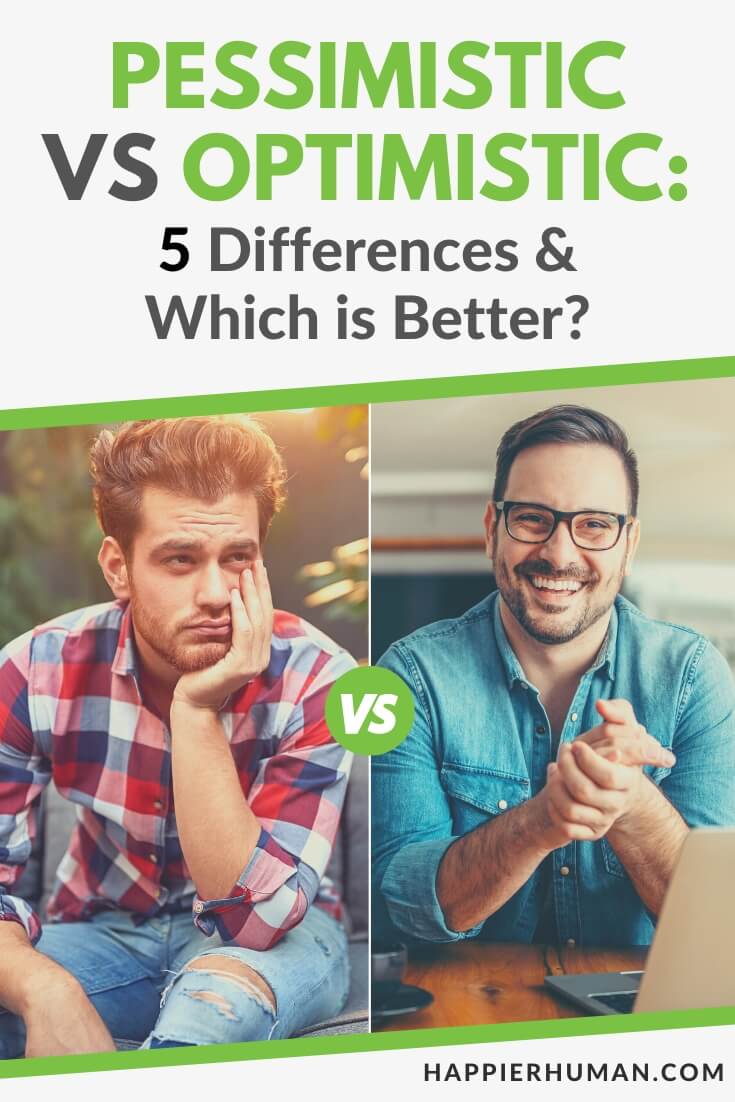Have you ever noticed how two people can look at the same situation and each come away with their own conclusions? One sees what happened as a good thing, the other as a bad thing.
This is common in sports when you have already picked a side before the event ever occurs. But what about the times when there was nothing to be gained by the sequence of events, yet each opinion is vastly different?
For example, when your child’s school is closed for a snow day, some parents don’t mind and see it as an opportunity to play with their kids in the snow. Others value a break from their kids and dislike when school days are canceled.
So, with the same set of circumstances, there are two different points of view – one good, one not. Such is the case with most of life. And it usually depends on how each circumstance affects us.
Unfortunately, some people are mentally or emotionally wired to see everything they face through one lens. Either positive or negative.
What Does Pessimistic Mean?
When a person is pessimistic, they think bad things will likely happen in any given situation. For instance, a lady is planning her wedding, and everything is going as planned.
However, she is waiting on the “ball to drop” (for something unavoidable to go wrong) because things are just going along “too smoothly.” She believes that something always happens to cause a setback or ruin her plans entirely.
Additionally, someone who is pessimistic focuses on the bad part of an occurrence rather than the good. For example, my friend Tina was planning a birthday party for her son Dillan. She invited over 30 kids from her son's school and youth group at church. Unfortunately, only 8 of the children showed up because the fair was in town that same weekend.
Dillan enjoyed his party and was grateful to his mom for throwing “The Best Birthday Party Ever.” However, Tina was angry inside and felt the party failed because so few kids showed up.
She chose to look at the negative of the situation rather than focusing on the fact that her son really had a good time on his birthday, which was the main objective.
Doctors can often be considered pessimistic when they are not hopeful that a patient will have a positive outcome from surgery, illness, or injury. They usually look at things based on knowledge and experience in the field.

But being pessimistic often drives a person to look at the cup “half-empty” and only base decisions on the likelihood that things will go wrong. It often leads to excuses and reasons for not trying new things, even when trying to obtain or achieve something a person has always wanted.
For instance, Jeremy had a long-time crush on his co-worker Lita. However, he never asked her out on a date because he feared she would turn him down. Most of his apprehension was based on the lack of value he placed on himself and the pedestal he put her on.
So, he kept telling himself and others that she was “out of his league.” Little did he know she liked him too, but because he was so pessimistic about the situation, he never learned how she felt about him.
Being pessimistic can cause us to lose out on tremendous and life-changing things. It just takes an open mind to look at things differently.
What Does Optimistic Mean?
Being optimistic means believing that great things will happen in the future. It is when someone is hopeful and confident about things that are about to occur, even when challenges are associated with them. It is when a person sees the cup “half-full.” Even if it's not likely, an optimistic person will look for good things to come to fruition.
For example, Stephen and Jill went to a basketball game to see their favorite team play. Jill tried to convince Stephen to leave the game early and beat traffic. Because there were four minutes left in the game, and their team was down by fifteen points.
However, Stephen, the optimist, wanted to stay until the end because he felt the team would make a last-minute comeback, and he did not want to miss it.
Being optimistic can often be confused with being naive and ignorant of how things may work out. However, many more people, 86% of Americans, according to the Life is Good Optimism and Positivity Survey, have hope that the future has great things in store for them.
Being optimistic opens that door to many possibilities. Have you ever heard the saying, “If you don't ask the question, the answer will always be no?” For instance, Gerald received a job offer from one of his company's competitors. Along with the job, he would receive a 10% bump in pay.
He was strongly considering the job because he has a son in college and a daughter about to start college in the fall. But he did not want to leave his current company. In addition, Gerald loved the company culture and had 20 years of seniority.
Being optimistic that his company valued him, he went to his supervisors. He showed them his job offer, asked if they could match it, and explained his financial situation.
Respecting and valuing Gerald, the leadership team worked out a payment arrangement for Gerald that would compensate him better than what the competition was offering.
As a result, Gerald got to stay at a job he loved and get the pay he needed to take care of his children's college.
Things don't always work out that way, but had Gerald not been optimistic about the outcome, he would never have tried it.
Pessimistic VS Optimistic: 5 Differences & Which is Better?
Difference #1. On Self-Confidence
Being pessimistic shows a lack of self-confidence, but being optimistic gives a person self-confidence.
For instance, in 10th grade, I had to take a mandatory speech class. I hated standing before people and giving speeches (because I feared being embarrassed in public).
So, my outlook on the course was one of pessimism from the start. As a result, my lack of confidence showed to the other students in the class and the teacher.

The teacher often told me I was speaking too fast or too lowly, and I rarely made eye contact with my audience. One day during a speech, I nervously kicked the teacher's desk, and everyone had a great laugh except for me. Needless to say, my grade suffered in the first nine weeks of the class.
However, later I gained more confidence and chose to work diligently on delivering my speeches. Before long, I got better grades and lost my fear and dread of speaking in front of the class. With each passing speech, I became more optimistic about the outcome.
That year I went from the quiet, shy kid, no one could get to say much to the guy everyone wanted to hear from.
Difference #2. On View on Life
To a pessimist, life can be evil and dull; but, life can be exciting and colorful to the optimist.
Take a look at Donna. Donna was self-proclaimed pessimist, but her husband Aaron was an optimist, especially when it came to their children playing outside. Donna worked as a police dispatcher, so she was well acquainted with some of the bad things that happened in and around the city.
She had heard the worst of the worst while doing her job… which made her very uncomfortable and untrusting of others, especially around her children.
Aaron was different. He managed a local grocery store and loved interacting with people. Aaron also volunteered as a softball coach in his spare time. He saw the benefits of children running and playing with other kids their age.
In fact, it brought him great joy and made him nostalgic for the days he had as a kid. Regarding the children's activities, the two often butted heads.
Difference #3. On Facing Challenges
Pessimists avoid challenges in life and see them as burdens. optimists embrace new challenges and see them as a blessing.
My friend, Raymond, was in a car accident when he was 12, leaving him blind in his right eye. Stella, his sister, was in the same accident and left paralyzed from the waist down.
Raymond often complains about only having the use of one eye. He feels it is holding him back from doing more things in life and views it as a huge burden.
Stella, on the other hand, sees her situation and his as a blessing. She feels they are both blessed to be alive and grateful to have a chance to go out and do things they enjoy.
Furthermore, she makes no excuses for her condition and doesn't want anyone to feel sorry for her. Therefore, it is no surprise to see her competing in wheelchair basketball games and races.
Difference #4. On Obstacles
Pessimistic individuals feel hopeless and weak due to their obstacles. however, optimists see their obstacles as improving their lives, making them stronger and wiser.
Tanner’s family has had financial issues for years. His parents cannot buy him name-brand clothing, give him an allowance, buy him snacks for class, or let him participate in little league sports as many other children do.
This gave Tanner a pessimistic view of life, making him feel inferior to other kids. He is often made fun of by the other students in his school, making him feel miserable, and his situation hopeless.
Sarah, Tanner's older sister, often encourages him to look at things differently. She is now in college and paying her way through school by being frugal. Sarah is wise with her money and saves up for a rainy day.
Furthermore, Sarah feels the obstacles she went through from growing up poor have helped her make smart choices. Therefore, she tries to encourage her little brother to look at things the same way.
Difference #5. On Chasing Dreams
Pessimists are afraid to have their dreams shattered by unfortunate circumstances; but, optimists throw caution to the wind and chase their dreams.
For a long time, I had dreamed of being a writer. But I was pessimistic about it, believing no one would give me a chance, no one would care what I had to say, or someone would shatter my dreams by telling me that my writing was no good.
This view kept me from trying for a long time, and because I did not try, I had no opportunities. Finally, when I decided to try it on my own, my laptop crashed, and my greatest fear became a reality.

However, my baby sister knew about my desire to write and heard about my laptop. So, a few weeks later, on Christmas day, she came to my house and gave me a computer.
As a result of her faith in me and her generosity, I threw caution to the wind and began writing my first book. I saw the stars aligning and felt it was a sign that I needed to change my view and chase my dreams.
Over the past four years, I have watched my dream become more of a reality as I changed my thinking. Therefore, bringing me much more joy and happiness to see what I have prayed for come to pass.
I believe greater opportunities and more open doors are on the horizon as I keep a positive attitude and do not give up.
So, Which is a Better Mindset to Cultivate Throughout Life and Why?
No person can ultimately be labeled as a pessimist or optimist in every circumstance. For example, you can be optimistic about your marriage, relationships, and career… yet be pessimistic concerning the state of the economy or world affairs.
One of the significant factors in our outlook on life is unmet expectations. The heartbreak and disappointment we may have experienced can be so severe that we gravitate toward a pessimistic view to shield us from being hurt again.
For instance, someone has an unfaithful spouse, leading to a divorce. As a result, that person has trouble connecting with new people in the future because they have a pessimistic outlook regarding the likelihood of relationships working out for them.
All-in-all, it is better to be optimistic than pessimistic. Optimism gives you the confidence and courage to try new things, and you are more likely to see things through to the end. Being pessimistic can not only hold you back, but also keep you from going after your desires and dreams.
Additionally, it can become a form of self-sabotaging behavior. Moreover, a negative mindset can be a chain around our necks (meaning we will only get so far in life).
Walking through life as a pessimist is like a dog being chained up in the backyard. It may run after what it wants, only to be hung up by the chain and held back from obtaining what it is running after.
Before long, the dog becomes stagnant and doesn't attempt to go further than its base for fear of being held back again. They may appear sad or depressed as a result of it.
A famous American Philosopher, William James, once said of optimism and pessimism, “Pessimism leads to weakness, optimism to power.” More than likely, the weakness of pessimism is due to some past pain or lingering hurt that has us tied down to one spot in a world of endless possibilities.
The power of optimism, on the other hand, releases us to roam free and have many great experiences. And that, my friend, is something you owe to yourself.
Final Thoughts on Pessimistic VS Optimistic: 5 Differences & Which is Better?
We all have internal filters through which we view life, good or bad. It is how we respond to a set of circumstances that will dictate the results. Pessimism and optimism can each play a role in how our life turns out, but it is important to utilize them appropriately and with caution (ever hear of false optimism?).
I wish we may all live life with more optimism than pessimism. Optimistic people are generally happier people. That doesn’t mean we should be delusionally optimistic and overly confident about opportunities in life… but it’s ok to see the glass half full.
There is always a point when we have to be realistic. However, optimism is about being confident enough to do our best and believing it is enough to see great results.
Think of optimism like a farmer who tends to his crops. Farmers plant seeds in the ground. Then they optimistically water them thinking they will grow into a harvest of crops.
Pessimism about the future crop kills the seed. So, the seed goes unwatered, no harvest is produced, and time and money are wasted.
But optimism drives the farmer to do all they can and remain hopeful for the results. In life, we must do what we can and trust the results. “It's better to have tried and failed than to live life wondering what would've happened if I had tried.” – Alfred Lord Tennyson.
Finally, if you want to identify YOUR personality type, then take one of these 11 personality tests to better understand what makes you tick.


